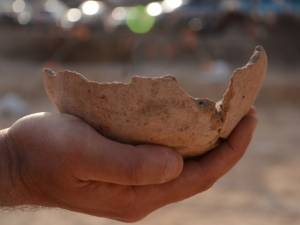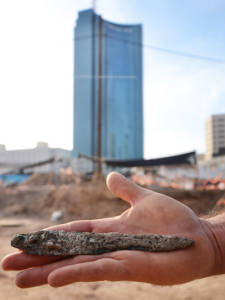
A bowl dating to the Early Bronze Age I. (Yoli Shwartz/IAA)
The latest archaeological find in Israel sheds light on drinking habits 5,000 years ago, when ancient Egyptians enjoyed a good beer in the same area that would one day become Tel Aviv.
Tel Aviv was the vibrant “city that never sleeps” already thousands of years ago and the beverage of choice was beer, according to new archaeological discoveries in the heart of the modern city.
Fragments of ancient pottery vessels used to prepare beer were recently discovered in excavations conducted by the Israel Antiquities Authority (IAA), and evidence indicating the presence of an ancient Egyptian population from more than 5,000 years ago is being exposed currently on HaMasger Street in downtown Tel Aviv in salvage excavations prior to the construction of office buildings.
Diego Barkan, director of the archaeological excavation on behalf of the IAA, said that they uncovered 17 pits that were used to store agricultural produce in the Early Bronze Age (3500-3000 BCE). They discovered, among the hundreds of pottery shards that characterize the local culture, a number of fragments of large ceramic basins that were made according to Egyptian tradition and used to prepare beer. These vessels were manufactured with organic material, such as straw temper, in order to strengthen them, a method not customary in the local pottery industry.
Vessels such as these were found in the Egyptian administrative building that was excavated at Ein Besor in the Negev. On the basis of previously conducted excavations in the region, the IAA knew there was an Early Bronze Age site in Tel Aviv, but this excavation is the first evidence of an Egyptian occupation in the center of Tel Aviv at that time. This is also the northernmost evidence available of an Egyptian presence in the Early Bronze Age.
Ancient Egyptian Presence in Land of Israel
“Until now we were only aware of an Egyptian presence in the northern Negev and southern coastal plain, whereby the northernmost point of Egyptian occupation occurred in Azor. Now we know that they also appreciated what the Tel Aviv region had to offer and that they, too, knew how to enjoy a glass of beer, just as Tel Avivians do today,” Barkan said.

Bronze dagger found against the backdrop of the excavation and towers. (Yoli Shwartz/IAA)
Beer was the “national drink of Egypt” in ancient times, and it was a basic commodity like bread. Beer was consumed by the entire population, regardless of age, gender or status. It was made from a mixture of barley and water that was partially baked and then left to ferment in the sun. Various fruit concentrates were added to this mixture in order to flavor the bee, which was filtered in special vessels prior to use. Excavations conducted in Egypt’s delta region uncovered breweries indicating that beer was already being produced in the mid-fourth millennium BCE.
Barkan said that a bronze dagger and flint tools dating 6,000 years ago to the Chalcolithic period were also found at the site.
By: Aryeh Savir
Staff Writer, United with Israel

Free Ebook: 10 Best Places to Visit in Israel
The Land of Israel has provided the backdrop for some of the most important events in human history. From the Old City in Jerusalem to the Sea of Galilee, people from all over the globe visit the Holy Land each year to take in the breathtaking scenery and inspiration of Israel. Now you can experience this beauty for yourself from the comforts of home and maybe plan a trip of your own to Israel. Get the free, exclusive eBook from United with Israel: The 10 Best Places to Visit in Israel.
Send Passover Packages to Needy Israeli Soldiers - Bring Them Joy!
We are honored to thank the young men and women of the IDF who risk their lives every day to protect the citizens of Israel. Since October 7th, soldiers have been on the battlefield for months - many are hoping to come home for Passover.
Join us in sending Passover food packages (and personal notes) to Israeli soldiers and their families.
Many soldiers spend the Passover holiday with needy families back home. The soldiers greatly appreciate your love and concern. Bring them Passover joy!
CLICK HERE TO SEND YOUR PACKAGE AND NOTE TO ISRAELI SOLDIERS!




